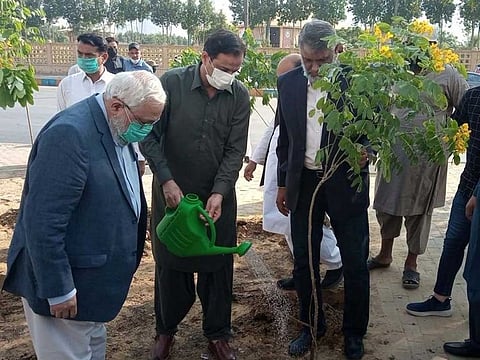Karachi municipality to grow 300 Miyawaki forests
Municipality to join hands with NED University of Engineering & Technology

Karachi: The Karachi Metropolitan Corporation (KMC) is planning to plant 300 small forests in different parts of the city using the well-known Japanese Miyawaki Technology.
This was announced by Karachi’s Administrator, Murtaza Wahab, as he launched the second Miyawaki forest in Karachi under the auspices of the KMC in the boating basin area of the city near the coastline.
The KMC has been collaborating with one of the oldest and largest engineering universities of the country - the NED University of Engineering & Technology in Karachi - that has been celebrating the centennial year of its foundation, to build Miyawaki forests in the city. The first such forest was launched at Hotel Metropole intersection in the city’s downtown.
Vice-Chancellor of NED University, Prof Dr Sarosh Hashmat Lodi, Karachi’s Metropolitan Commissioner Afzal Zaidi, and Director-General, Parks, of KMC, Junaidullah Khan, and other officials were present at the launch of the second Miyawaki forest in the city.
Speaking on the occasion, Karachi’s Administrator said that extensive tree plantation in urban centres of Pakistan had become inevitable to combat the negative effects of climate change and global warming.
He said Miyawaki technology would be used to plant 80 to 90 trees of different species very close to each other so that the smallest urban space available to the KMC could be most effectively utilised to increase green cover in the city.
He said that Miyawaki technology was also suitable for a water-starved city like Karachi as forests planted while using the Japanese method were capable of retaining maximum quantity of monsoon rainwater.
He urged the corporate entities and other organisations in the city to come forward and take part in the joint drive of the KMC and NED University to increase greenery in Karachi.
He said the concerned citizens of Karachi should own the drive to plant trees so that the coming generations could see a clean and green Karachi.
Other than the KMC’s efforts to grow forests, the Clifton Urban Forest in Karachi, in the non-governmental sector, launched after 2015 deadly heatwave of Karachi, has 1,050 trees of 32 native plant species in just 300 square metres area.
Sign up for the Daily Briefing
Get the latest news and updates straight to your inbox







